Dr Simon Duffy explores ONS data on inequality and poverty and tries to get behind the myths and lies used to exploit the poorest in the UK.
Author: Simon Duffy
Dr Simon Duffy explores the facts behind poverty and inequality in the UK. He argues that the current political system is not concerned with eradicating poverty and that current rhetoric about poverty and inequality largely serves to disguise the injustice of the current system.
Poverty in the UK is a serious problem, and it is a problem that is often ignored or wilfully misrepresented in political debate. Social injustice is wrong, but misrepresenting the nature of social justice is doubly wrong, because it encourages further injustice.
Of course there are natural and selfish reasons why we may all want to misunderstand the nature of justice, and usually such misunderstandings start by distorting a half-truth rather than deploying a lie. In the UK a common distortion starts with a twin pair of assumptions that are not exactly false, but are highly misleading:
The first assumption is utilitarian. It is claimed the free market exists to serve the overall good; and there are good reasons to believe that markets can sometimes perform a useful social function. The second assumption is deontological. We are free to make our own decisions and promises, but we must accept the results of those decisions, even if other people seem to be doing better than us. In the UK people who believe strongly in these two assumptions, like the philosopher John Stuart Mill, are called liberals (although confusingly the term liberal means something very different in the USA).
Liberalism is a great philosophy, if you are wealthy, because it offers you a double comfort: Not only are you entitled to whatever you've got, but you can also persuade yourself that you are part of a system that is good for everyone (in the long-run).
However it does not take much imagination to realise that this cannot be the whole story. For injustice is a logical consequence of unrestrained economic freedom, and in every decent society there have always been systems, rules or institutions that are designed to reduce the injustices created by economic freedom.
Just think about what happens if we simply allowed people absolute economic freedom. First, those people who are more successful may, over time, use their economic power to guarantee their own future success and so make it harder for others to compete with them. This is why democratic governments tend to restrict monopolies or replace monopolies with nationalised industries, like the NHS, which work for everyone's benefit. It is also why public education and free university education matter, because it reduces the advantage the better-off can buy for their children.
Second, people who lose out will become more desperate, unable to sell their labour for income or only able to sell it at a very low price. This is why democratic government's have been forced to both set minimum wages and to create income security systems to redistribute money towards the poorer half of the population.
There is nothing in a free economic market that ensures that you will get a fair, reasonable or even adequate price for your labour. That’s not how markets work. If you are very poor then you must be prepared to sell your time for next to nothing. Economic freedom has never naturally protected the interests of the poorest, the weakest or those without power. Instead it often releases the very worst in our nature: greed, avarice, pride and the sadistic pleasure of exploitation.
These statements should not seem controversial or challenging. They represent some of the hard-won lessons of the twentieth-century, a century which proved that the price we can pay for ignoring social injustice is revolution, war, terror and Holocaust. So, it may seem surprising that, in the early years of the twenty-first century, we seem to be in danger of forgetting all these important lessons. Not only do the half-truths of liberalism seem to be back in fashion, but many are even tempted to go a little further and embrace some utterly false beliefs:
I think it is obvious that these beliefs are false; and I think it is also obvious why they are tempting. This kind of thinking is no longer liberal, it is much closer to fascism or eugenics. It pictures some humans as more valuable, more productive, more equal than other humans. Dog-eat-dog economic freedom is twisted into an engine for human improvement. I think it is this kind of extreme liberalism that is sometimes called neoliberalism.
It is also fascinating (in a rather horrible way) to see how the rather different idea of meritocracy has increasingly been promoted as if it offers a positive vision for society. This is peculiar in the extreme. Meritocracy means that 'the best' people should have the most power (and, it is typically assumed, the most money). In fact the term meritocracy is simply a modernised form of aristocracy - 'aristos' being the Greek word for the 'the best'. The difference is that the best is now presumed to be some cocktail of ‘the clever,’ ‘the powerful’ and ‘the rich’ - rather than landed nobles.
Old-fashioned liberalism was often combined with a commitment to charitable action: We have other obligations beyond keeping our promises, and any financial success should bring extra social responsibilities, much in the same was that old-fashioned aristocrats used to believe that they had extra responsibilities to the commoners - "noblesse oblige". It was for this reason that many of the early pioneers of capitalism (Rockefeller, Carnegie, Harkness etc.) actually did spend much of their money on works of public philanthropy.
However, today’s neoliberals and their meritocratic cousins seem much less interested in social or moral responsibility. Success is not an invitation to exercise social responsibility, it is merely the proclamation of the right of the powerful and rich to seek even higher rewards for themselves, and to look down their noses on those with less money or with different gifts. Liberalism and meritocracy merely justify growing injustice: encouraging the powerful to believe they are entitled to more money; encouraging the wealthy to believe they are entitled to more power. As shallow philosophies go we are scraping the bottom of a very deep barrel.
How have we got here? How have we forgotten the lessons of the past? Why do we even begin to treat these crazy and wicked views as somehow reasonable points of view. Although I am a Christian I do not believe that declining faith or moral standards is the best explanation. In fact countries like the USA, which have a very high rate of Church attendance, also seem to be just as morally confused as the agnostic UK. We will find better explanations I think if we look at the economic, social and political characteristics of our society.
I also think that, despite the fact that things are currently getting worse, there are several reasons to be hopeful. Social and economic changes are themselves driving us towards a crisis point that might ultimately be very helpful, although how quickly this change will take place is unclear. Although the rise of liberal and meritocratic thinking is a growing threat, I think there remains a stubborn awareness of older truths that hard to dislodge from the human soul:
Justice lives in poverty.
She survives.
She measures
What is necessary.
She honours what ought to be honoured.
She seeks out clean hearts, clean hands.
She knows what wealth and power
Grind to dust between them.
She knows
Goodness and the laws of heaven.Aeschylus: Agamemnon
In fact, even when our leaders try to exploit liberal and meritocratic prejudices they can only go so far, and often they try to manipulate language and statistics in order to cover their tracks. This tells us that not all hope is lost; there is no need for deception if all truth is gone.
What we find in practice is that modern politics is a little like street magic. The performer wants us to look in one place, while what is really important is happening somewhere else. In fact I think we can spot at least 10 myths that are commonly exploited to put our moral conscience to sleep:
I want to use this essay to not only challenge these myths, but more importantly to try and show how the use of these myths performs a useful social function for the political system. Ultimately I believe that, for all the worthy discussion about poverty reduction in the UK (from across the political spectrum) there has been no meaningful commitment to reduce poverty for over 40 years. This means that those of us who care about equality and social justice may need to think differently about our goals and our strategies.
Liberals will often argue that inequality is a natural part of the economic order and that if we want the benefits of a developing free-market economy then we must accept that inequality will naturally arise. Moreover they also argue that interfering with the labour market will have negative consequences. However, as Figure 1 show, if we look at the growth rate in the UK it has not increased as the UK has become a more unequal country, if anything it has declined.
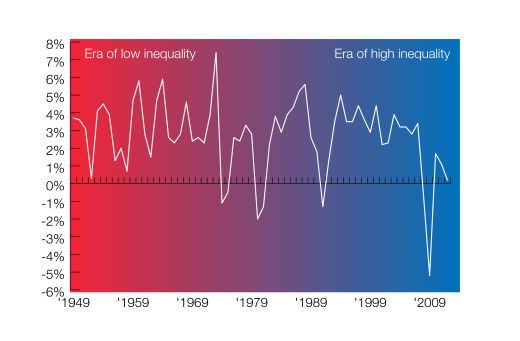
Figure 1. UK Economic Growth Rate 1949-2012
In fact inequality has not benefited the economy and there are many ways of combining economic freedoms with social justice, primarily through redistribution and other social and economic policies.
Another common proposition is that we should not care about equality, just about growth. If an economic policy raises the standard of living of everyone then the fact that some people benefit more is irrelevant. But, as we have seen, the opposite is true - inequality seem to reduce growth. So what we should really pay attention to is who does benefit from economic growth.
The following data is all taken from the Office for National Statistics, who publish detailed information on the family (household) incomes for every year from 1977 onwards. This allows us to compare how the incomes of different groups changed between 1977 and 2014. We can compare and contrast these incomes more effectively by bring them into line with the values for 2014. Figure 2 shows how incomes had changed - before any redistribution by tax or benefits - between 1977 and 2014. I have adjusted the data from 1977 to bring it in line with the data from 2014 by showing how income distribution for households would look if 1977 had the same average household income as households did in 2014.
We can see that relatively only the top 20% of families have really benefited from economic change during this period (although there is also a tiny uplift for those in the second decile). So, broadly, we can see:
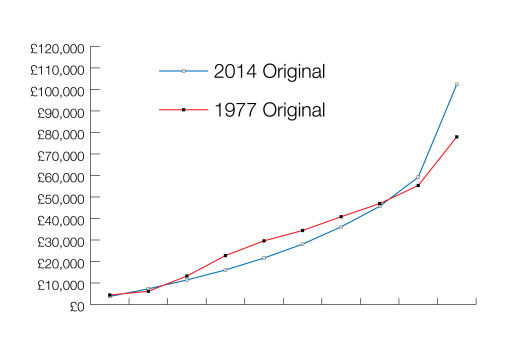
Figure 2. Comparing Distribution of Original Incomes 1977-2014
So, during the post-1977 period growth has declined (as per Figure 1) and economy has skewed the benefits of that reduced growth to the better off. This means the poorest are losing twice: lower growth and higher inequality.
It is often assumed that the welfare state almost automatically benefits the poorest most. However, as we shall see, the reality of the welfare system is not quite what people believe. The welfare state’s primary direct impact comes in three forms:
Now if we compare the incomes after taxes and benefits between 1977 and 2014 as we do in Figure 3 we can see that, rather than increasing the incomes of the poorest, the system's function has been to increase the incomes of middle-earners.
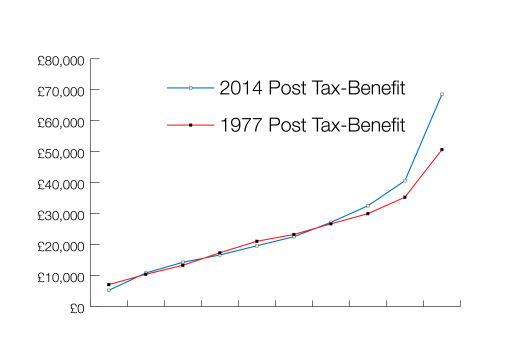
Figure 3. Comparing Post-Tax-Benefit Incomes 1977-2014
This means that we should be very careful to examine two very different kinds of impact on family income. Some of these changes seem to be economic. We can see a significant drop in the incomes of almost all groups, except the wealthiest 20%. However we can also see that tax-benefit policy during this period has been engineered to bring about changes that are just as significant as the economic changes. In fact it looks very much like, as the economy has depressed middle-incomes so the tax-benefit system has been used to reflate them.
Because the poor were already so poor and the rich were already so rich the changes are best understood using percentages and ratios. So here are some key facts:
It is these facts that explain the focus by politicians on the ‘squeezed middle.’ However it is not that the middle has been squeezed by the poor or by economic policies that support the welfare state. Instead most of the tax-benefit system is focused on increasing the incomes of those in the middle. In fact as we can see in Figure 4 and Figure 5, between 1977 and 2014 income has been taken off the poorest and redistributed towards the middle.
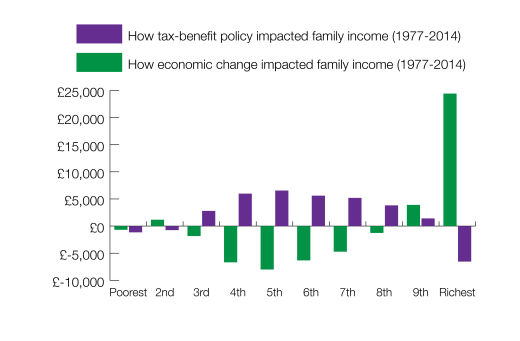
Figure 4. Changes in income for families 1977-2014
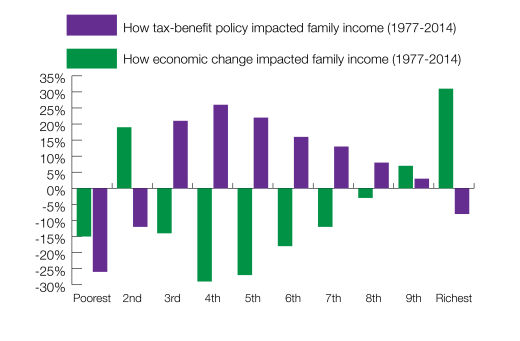
Figure 5. Percent changes in income for families 1977-2014
What is really going on is a fundamental change in the structure of the economy. Growth continues, but the beneficiaries of growth are getting fewer - basically only the top 20%. The welfare system is not primarily being used to benefit the poorest, it is primarily organised to support the middle.
One of the biggest deceptions of everyday political rhetoric is the use of the term ‘taxpayer.’ The term is often used to imply that there is some group, the better-off, who are somehow contributing the most, and that the poorest are in someway not taxpayers. This deception relies on pretending that the only significant tax is income tax - but this not true. Income tax is the biggest tax the richest pay, but for others indirect taxes, like VAT, are much more important.
For the following figures I have primarily used the latest ONS data (ONS, 2017). So, if we take all the taxes people pay, and then compare it to their total income then the group that pays the highest rate of tax is the poorest 10% of families - who pay more than 10% more in tax than any other group.
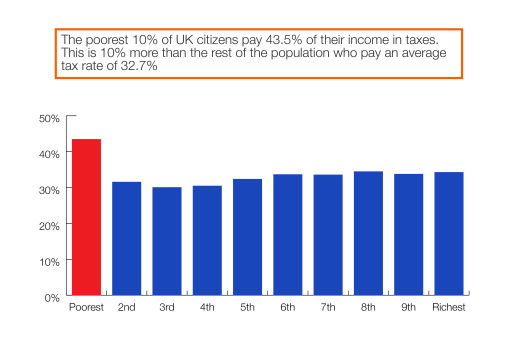
Figure 6. Overall rate of tax paid by household
The reason for this is that the UK tax system is regressive - which means it hurts the poorest most - because it relies to such a high degree on indirect taxes, taxes on spending, not on income. Figure 7 compares the detailed breakdown of taxes paid between the poorest 10% and the richest 10%.
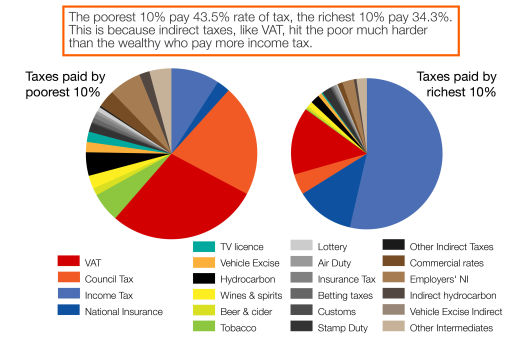
Figure 7. Comparing the different taxes paid
A similar deception is that only the poor are ‘on benefits.’ Nothing could be further from the truth. Every group benefits from benefits and the poorest do not even benefit the most. In fact it would truer to say that we’re all on benefits and that the primary beneficiary of benefits is the middle-income earner. However this deception is maintained by treating some benefits, like tax credits and pensions, as if they are not really ‘benefits.’ This serves to aid the natural desire of the better-off to see themselves as somehow distinct from those relying on Job Seekers Allowance or Employment and Support Allowance.
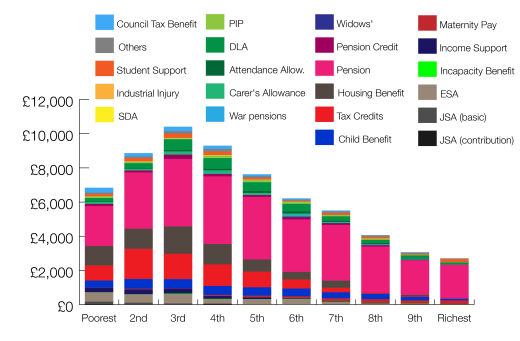
Figure 8. Distribution of benefits across different income groups
Another common lie is that benefit fraud is a significant problem. In fact, benefit fraud is very low indeed. It is dwarfed by tax fraud and even more by tax avoidance (the legal but immoral effort to avoid your social responsibilities). The fact that the public seem to believe benefit fraud is so much greater must have something to do with the way in which politicians and the media have exploited an image of some people in society as being somehow particularly unworthy. This problem certainly began before Austerity as it was the new Labour Government who launched the ‘Benefit Thieves’ campaign which pandered to this non-existent social problem.
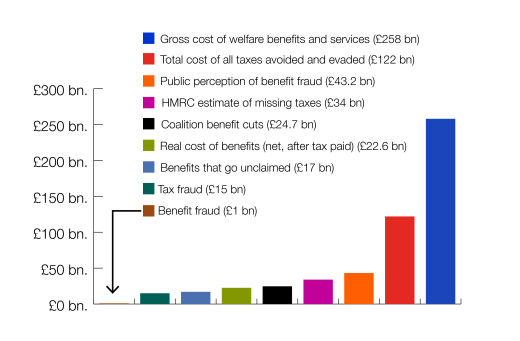
Figure 9. Benefit fraud in context
One very striking statistic is that the poorest not only pay lots of tax, mostly indirect taxes like VAT, but they also pay a significant level of income tax. This is surprising because their incomes are so low they should not be paying any income tax. However, the poor have no accountants, and I suspect that the application of emergency tax rates for short-term work means that the government is actually defrauding the poorest by over-taxing them. In addition the £17 billion of unclaimed benefits could also be treated as a form of government fraud - creating a system so complex - no one knows what they’re entitled to.
What we must ask is who benefits from this kind of rhetoric. It certainly provides a useful distraction from the real issues, including growing inequality. Perhaps there is a sense in which this is a further price of a declining middle-class. As incomes drop, status is threatened. Perhaps, as well as propping their income through tax and benefit changes politicians are pandering to the need of middle-income earners to feel morally superior to those who are poorer. I suspect the negative skiver, scrounger, fraudster rhetoric is really the mirror image of the as 'hard-working families' 'the squeezed middle' or 'alarm-clock Britain'. The rhetorical purpose is to divide us and delude us. Money is transferred from the poor to the middle, but stigma is added to the poor to make the middle feel less bad about this act of theft.
Another common fallacy is that the benefit system is primarily about supporting people who are out of work and that benefits need to be low in order to discourage people from becoming dependent upon them. But even a cursory glance at benefit spending destroys that myth.
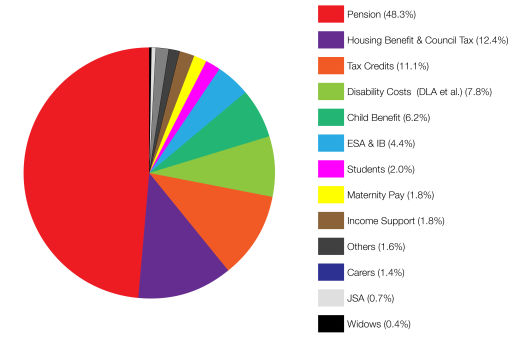
Figure 10. Different benefits used
Job Seekers Allowance (the UK's unemployment benefit) represents 0.7% of total spending. Whereas the four main benefits (nearly 80% of the benefit bill) are not even really directed to address poverty at all:
The poor are in no danger of becoming over-dependent on benefits. Instead the whole of economy is dependent on a significant level of income redistribution and social security simply to function. The shame is that the poorest are treated so poorly by that system - stigmatised and impoverished.
The UK's spending on the welfare state is higher than some countries and lower than others. It has remained at a fairly constant level over a long period. There is no reason to think that welfare spending is unsustainable; it is only unsustainable if we refuse to pay for what we think is necessary, and this just requires us to adjust taxation levels. Politicians like to pretend that there is some crisis in order to justify policies they believe will bring them electoral advantage. We should ignore them.
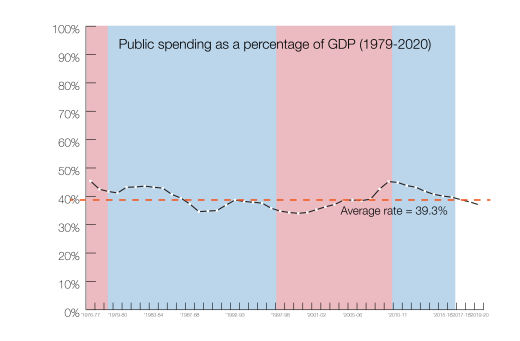
Figure 11. Government spending over time
Often it is spending on benefits that is represented as the greatest and most unsustainable cost for the welfare state. What is more it is claimed that the poorest may have become dependent on these benefits and that cuts in services or income are necessary to get people 'off benefits' and into work. In fact the truth is much more interesting.
First of all, as we have already seen in Figure 6, the cost of benefits is hugely exaggerated by ignoring the fact that most benefits are paid straight back in taxes. If we calculate the net or real cost of benefits - after taxes we find that the cost of benefits is very low indeed: £27.8 billion or 1.4% of GDP.
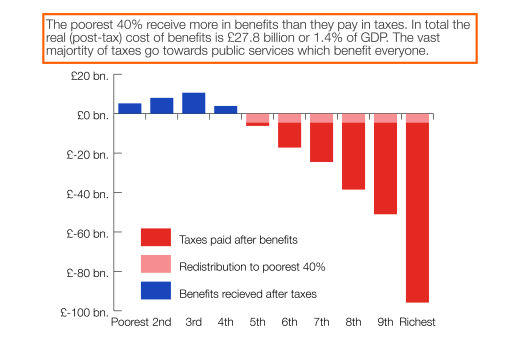
Figure 12. The real cost of benefits
Benefits are not even strictly government spending, they are a transfer payment, reducing one person's income through taxes and increasing another with a benefit. The fact that benefits are presented as government spending is really just a trick of accountancy. If instead we accepted that redistribution was an essential feature of a modern economy we would distinguish it much more clearly from public spending, such as the NHS and education. Currently we’ve got things the wrong way round; we treat redistribution as a somewhat dubious feature of the welfare state, rather than as its primary function.
A further rhetorical trope, that turns out to be a lie, is the idea that government will naturally and quite properly protect those in most need. This line has been particularly important during the Austerity period, although it is not an uncommon lie at the best of times. For instance, I have explored elsewhere, and at some length, how austerity policies targeted those on low incomes, and in particular disabled people with the greatest need. The UK Government’s policies have been so shameful in this regard that the United Nations has openly criticised the UK for failing to meet its human rights obligations:
“The Committee is seriously concerned about the disproportionate adverse impact that austerity measures, introduced since 2010, are having on the enjoyment of economic, social and cultural rights by disadvantaged and marginalised individuals and groups. The Committee is concerned that the State party has not undertaken a comprehensive assessment of the cumulative impact of such measures on the realisation of economic, social and cultural rights, in a way that is recognised by civil society and national independent monitoring mechanisms (art. 2, para. 1).”
UN Committee on Economic, Social and Cultural Rights: Concluding observations on the sixth periodic report of the United Kingdom of Great Britain and Northern Ireland. 24 June 2016
I won’t repeat all of my earlier analysis of the cumulative impact of the cuts here. However I will note, as shown in Figure 13, that one of the features of the welfare state that enables such deception is its complexity.
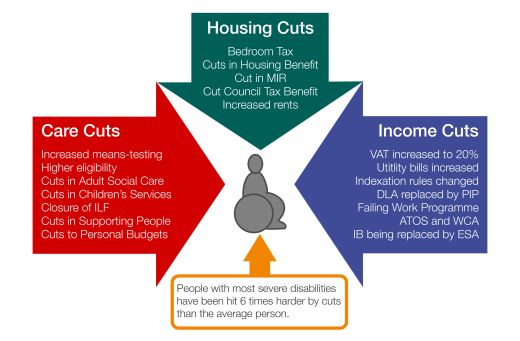
Figure 13. The different cuts impacting disabled people
Complexity allows for various changes to go unnoticed or to be misunderstood:
The general rule of thumb in understanding political changes to the welfare state is not to look for fairness or rationality, but to try and identify where short-term political advantage lies. If the primary strategy is to provide tax-cuts to groups who will provide political support then making cuts at any point and by any means can be expected.
Poverty is not just political, it is also economic. The real situation is something as follows:
Over time inequality has increased as:
On a technical level I think this is also why the Gini Coefficient is a rather inadequate measure of inequality, because it gives too much weight to middle incomes. It makes much more sense to examine the discrepancy between the richest and the poorest, as Figure 14 does.
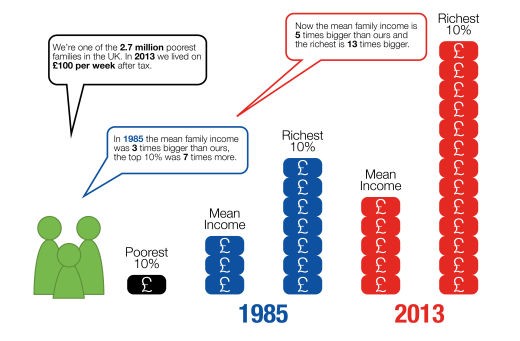
Figure 14. How inequality doubled in the UK
It is also important to ensure that in presenting data about poverty we do not fall into the trap of ignoring taxes. It is the post-tax and post-benefit data that is most important. So today, as Figure 14 shows, the UK has a very high level of inequality and a very high level of poverty. 6.5 million people must live on £51 per week after tax, to pay for all costs. This amount is totally inadequate and it is clear that even a modest tax increase for those on higher incomes could be used to radically increase the lowest incomes.
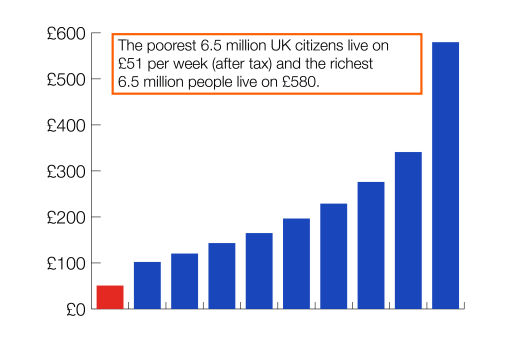
Figure 15. Inequality in 2016
This is why there are now 2,000 food banks in the UK. It is why mortality rates are falling for the first time since the creation of the UK. Poverty in the UK is severe, harmful and unjust - and completely unnecessary.
So far I have restricted myself to three main factors in shaping poverty and inequality: income, tax and benefits. But there are other important factors, which are also subject to political influence, that also impact on poverty in the UK.
Positively the existence of free public services, like health and education, is a great leveller, although in practice there often great distortions in the distribution and quality of those services. Nevertheless universality that takes public services out of the money economy is generally very positive. The fact that social care remains highly means-tested is significantly regressive. The rich look after themselves and make no commitment to the public system, the poor often have to impoverish themselves further to ensure they are entitled to vital services.
It should also be noted that public services also create jobs, often very well paid jobs, for those with middle-incomes. This is worth considering when we examine the overall redistribution created by the welfare state. The poorest certainly benefit from public services, but society becomes more unequal when pubic services also increase wage differentials. In other words many middle-income earners have their income lifted twice, both through the tax-benefit system and by taking up work in public services. It is the poorest who lose out on both accounts.
This is not a criticism of public sector workers - far from it - it is just drawing attention to the strange way we think about income and public spending. If the Government increases the salary of a doctor this will be good for the doctor, but it makes no obvious difference to the service I receive and, from the perspective of equality, it is has made a bad problem worse.
The data that I have focused on here - incomes, tax and benefits - doesn’t tell us about some other very important facts:
There is no excuse, as some in the Government plan, for reducing our focus on the economics of poverty. However we should take a holistic approach and ensure that we also look at the costs people have to pay. Moreover we should also examine the social conditions which make it even harder to bear the costs of poverty. real poverty might best be pictured as having several dimension, as set out in Figure 15.
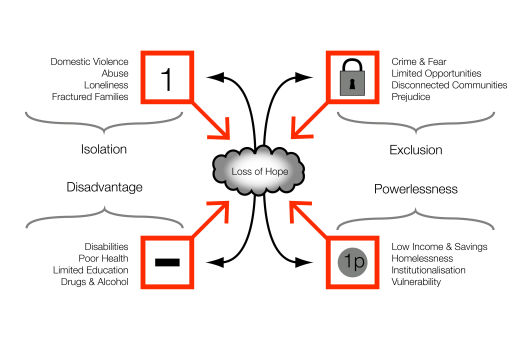
Figure 16. Real poverty
Personally I think we should move towards a more objective understanding of poverty, one which would enable us to eradicate poverty. I would define poverty as follows:
Poverty is the lack of all the resources necessary to participate as an equality in the life of the community
There is absolutely no reason why, by this definition, we cannot eradicate poverty from the UK.
If we assume that politicians are not naturally unjust, but are primarily motivated by the desire to get re-elected, then there are a number of factors that may help explain recent developments.
In a two-party system, focused primarily on economic well-being, lifting the income of median-income voters is going to be critical. In addition you must disguise fact that you are doing so is also important (a) because you are failing to address the needs of people in the greatest need (b) benefits are stigmatised and those groups don't want to be confused with stigmatised groups. Hence systems like tax credits are used to provide a benefit with lower levels of stigma for middle earners.
Furthermore this explains the increasing use of stigma, sanction, conditionality and control for those in the lowest income groups. Increasing the negative stigma associated with those on the lowest income also increases both a sense of superiority and a sense of insecurity - I don't want to become like 'them'. Abusing the poor becomes part of the street magic as it distracts people from noticing that most government policy is about subsidising the middle.
It is also important to acknowledge the changing structure of our society. If the interests of those who are poorest are unlikely to be represented, if people themselves are unlikely to organise to protect their interests, then exploitation is inevitable. Some of the more obvious social changes include:
Poverty has been privatised. Without the necessary level of social solidarity and connectedness this situation is unlikely to change.
Although the current trend looks very negative I think there are some opportunities for positive change. The decline for middle-income earners which has helped erode our focus on poverty and inequality will increase. Technology and other economic changes is going to see more people, younger people, people in white collar jobs feel that the current system is unsustainable. You can only rob the poor for so long - they’re too poor for the trick to last for ever.
I think many more people are going to be attracted to the concept of basic income as a solution which universalises income security. In a sense the interests of the middle and the poorest will - if this happens - start to coincide. This should be a good thing.
I also think that a growing number of us will realise that an economic model which assumes that the only valuable activities are measured by money will collapse. The attractions of family, love, citizenship and community do remain, even in a world impoverished by injustice and shallow thinking. As people begin to reconsider what is of real importance then we can also start to consider how best to build a world where everyone’s gifts matter.
Meritocracy and neoliberalism will remain a threat to moral sanity. Things will not get better on their own. But we can unite around different values and use the emerging economic crisis as the basis for building something better.
The publisher is the Centre for Welfare Reform.
The Politics of Poverty © Simon Duffy 2017.
NB. Most data is drawn from analyses of published ONS data, primarily ONS (2017) The Effects of Taxes and Benefits on Household Income, 2015/16. London: Office for National Statistics.
All Rights Reserved. No part of this paper may be reproduced in any form without permission from the publisher except for the quotation of brief passages in reviews.
nature & economics, social justice, tax and benefits, Article